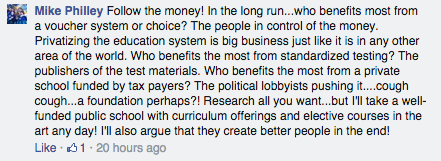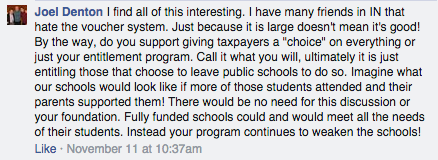Friday Freakout: What Teachers Say to School Choice Advocates vol. 1
Our previous two blog posts on how top-down reforms are not market reform and how school choice actually increases demand for educators garnered a lot of attention from public school teachers on Facebook.
As it’s one of our goals to listen and learn from more educators, we were excited so many were willing to take that first step by reaching out to us. Check out several of their first impressions and our responses in today’s freakout.
1.
To clarify, no one had discussed teaching practices, only school choice and issues in education. It is not uncommon for the opinions of non-teachers to be dismissed in this way by teachers. Several other anti-school choice commenters seconded Mr. Corliss. One said, “I’m a consumer of air travel. Obviously that makes me a pilot.” It’s totally fair for teachers to correct or add to a conversation based on their classroom experience, but there’s a way to do that without mean-spirited snark or assuming things about other people’s lives and experience. Regardless of our taking issue with tone, as taxpayers who support public education, the majority of whom are public school parents and students who consume education, we are all qualified discuss education.
2. 
To clarify, our foundation is a 501c3 non-profit organization, not a c4. We aren’t lobbyists, and neither do we profit from public education funds. Here are some quick-fire responses to Mr. Philley’s concerns:
- We actually are against compulsory high-stakes standardized testing.
- We would argue that the students who are no longer struggling, such as Salima, Denisha, Shawn, and Dillon, are benefiting most from tax-funded programs that pay for them to attend a private school.
- We aren’t against increased funding if an educational market has helped us all determine how much funding we need.
- We’re all for whatever curriculum offerings and elective courses school leaders, teachers, and communities think are best for their students.
- We think schools in every sector play a part in creating good people. No child’s experience is the same in every type of school.
Finally, follow the money, indeed. In a system of universal school choice, money would go to families then to the schools or combination of educational services that are educating their children. We wonder. Even if our taxes/government provided $1 million per pupil, would teachers like Mr. Philley still oppose a school choice system where funding follows the child?
3. 
We have. And many of our fellow advocates are or were living in poverty themselves. School choice has never and will never be about getting rich. It’s about opening up opportunities for families who need alternatives but can’t afford them without assistance.
4. 
Are taxpayers, especially parents of school children, not entitled to choose to leave public schools? Since when do only the wealthy have the right to choose their school? Let that concept sink in.
Of course, just because the Indiana voucher program is large doesn’t mean it’s perfect. We should always evaluate existing programs to find ways to improve. But interestingly enough, not one empirical study conducted by researchers from the anti-voucher Economic Policy Institute to the Manhattan Institute to our own organization, has ever shown the competitive effects from school choice programs are causing academic harm to public schools. A full list of those reports can be found on pg. 29.
Furthermore, we don’t need to imagine what public schools would look like if more students attended them. According to the NCES, the proportion of students enrolled in public schools in 2011 was the highest it had been since the 1940s, and it has been projected to increase every year from now. And according to a 2011 Gallup poll (the same year enrollments peeked), 72 percent of Americans said they had some, quite a lot, or a great deal of confidence in public schools. We’d call that support. At current rates of enrollment increase and without any increase in the financial assistance of school choice programs, the percentage of students in public schools in 2023, will be 91.4 percent. Yet with all of that said, a survey of Americans this year shows 61 percent say they would send their kids to alternatives outside traditional public schools if they could choose any type of school to obtain the best education for their children’s needs.
The fact is, no matter how well-funded, well-supported, or well-enrolled public schools are, they will never be a silver bullet solution for every child. The same way all private schools or all charter schools (etc.) are not a silver bullet solution either.
5. 
We’re glad teachers find the data and facts we provide useful; however, we wonder if our discussion that involve teachers’ unions are getting lost in translation. To clarify, we don’t blame unions for anything. To discuss teachers’ unions’ positions on school choice is not to claim they’re evil, the same way we don’t assume teachers’ unions are out to attack us every time they discuss school choice. We bring up unions only because they are the biggest entities that openly oppose school choice programs. They also spend the most money of any other group fighting it, whether that’s funding politicians who vote against bills, filing lawsuits against programs, and/or marketing to teachers and parents in communities to oppose a concept which they’ve likely never had the chance to research for themselves. Unions are simply relevant to the discussion of school choice.
To Mr. Weems’s other concerns, we’re actually on the same page regarding parent education and teaching. They are very important and a responsibility of schools in all sectors. That said, there doesn’t appear to be evidence to support cream skimming. Many school voucher, ESAs, and tax-credit scholarship programs are open only to low-income students, many of whom face struggles at home, or to students with special needs. Those are many of the people using vouchers, and they are often part of “the most difficult to help” category, too. Either way, voucher programs are completely voluntary. Parents and students don’t apply for them if they are happy with the way things are going. Doesn’t that say something in itself?
6. 
We totally agree with Ms. Fabsits for the most part. Our organization supports empowering teachers and school leaders with the freedoms many private schools are afforded. It’s time our system is structured in a way that treats educators as the highly-skilled professionals they are, not cogs who carry out orders from “above.” School choice programs wouldn’t hinder that change from happening. They actually could help incentivize a change in the system.
While it’s true many teachers’ initial touch points with us were negative, we honestly believe that, in time, that will change. We believe the more people on either side of school choice make an effort to share and understand each others’ perspectives, the less mistrust and misinformation—intentional or not—will spread. Our ultimate hope is teachers, many of whom might be reading right now, will see that we aren’t all talk. We do listen. We can find common ground. We can be a trusted resource for research and information. And most importantly, we respect and support them.




